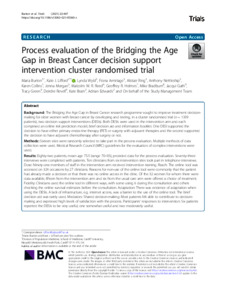BURTON, Maria, LIFFORD, Kate J., WYLD, Lynda, ARMITAGE, Fiona, RING, Alistair, NETTLESHIP, Anthony, COLLINS, Karen, MORGAN, Jenna, REED, Malcolm W. R., HOLMES, Geoffrey R., BRADBURN, Mike, GATH, Jacqui, GREEN, Tracy, REVELL, Deirdre, BRAIN, Kate, EDWARDS, Adrian, HARDER, Helena, WARD, Susan, RICHARDS, Paul, MARTIN, Charlene, CHATER, Tim, PEMBERTON, Kirsty, MURRAY, Christopher, WALTERS, Stephen, HERBERT, Esther, ROBINSON, Thompson, CHEUNG, Kwok Leung and AUDISIO, Riccardo
(2021).
Process evaluation of the Bridging the Age Gap in Breast Cancer decision support intervention cluster randomised trial.
Trials, 22 (1), p. 447.
[Article]
Documents
28832:590832
![[thumbnail of 13063_2021_Article_5360.pdf]](https://shura.shu.ac.uk/28832/1.hassmallThumbnailVersion/13063_2021_Article_5360.pdf)

Preview
Abstract
Abstract: Background: The Bridging the Age Gap in Breast Cancer research programme sought to improve treatment decision-making for older women with breast cancer by developing and testing, in a cluster randomised trial (n = 1339 patients), two decision support interventions (DESIs). Both DESIs were used in the intervention arm and each comprised an online risk prediction model, brief decision aid and information booklet. One DESI supported the decision to have either primary endocrine therapy (PET) or surgery with adjuvant therapies and the second supported the decision to have adjuvant chemotherapy after surgery or not. Methods: Sixteen sites were randomly selected to take part in the process evaluation. Multiple methods of data collection were used. Medical Research Council (MRC) guidelines for the evaluation of complex interventions were used. Results: Eighty-two patients, mean age 75.5 (range 70–93), provided data for the process evaluation. Seventy-three interviews were completed with patients. Ten clinicians from six intervention sites took part in telephone interviews. Dose: Ninety-one members of staff in the intervention arm received intervention training. Reach: The online tool was accessed on 324 occasions by 27 clinicians. Reasons for non-use of the online tool were commonly that the patient had already made a decision or that there was no online access in the clinic. Of the 32 women for whom there were data available, fifteen from the intervention arm and six from the usual care arm were offered a choice of treatment. Fidelity: Clinicians used the online tool in different ways, with some using it during the consultation and others checking the online survival estimates before the consultation. Adaptation: There was evidence of adaptation when using the DESIs. A lack of infrastructure, e.g. internet access, was a barrier to the use of the online tool. The brief decision aid was rarely used. Mediators: Shared decision-making: Most patients felt able to contribute to decision-making and expressed high levels of satisfaction with the process. Participants’ responses to intervention: Six patients reported the DESIs to be very useful, one somewhat useful and two moderately useful. Conclusions: Clinicians who participated were mainly supportive of the interventions and had attempted some adaptations to make the interventions applicable, but there were practical and engagement barriers that led to sub-optimal adoption in routine practice. Trial registration: ISRCTN46099296. Registered on 11 August 2016—retrospectively registered
Actions (login required)
 |
View Item |



 Tools
Tools Tools
Tools